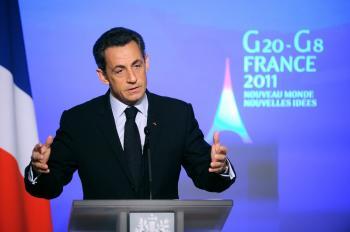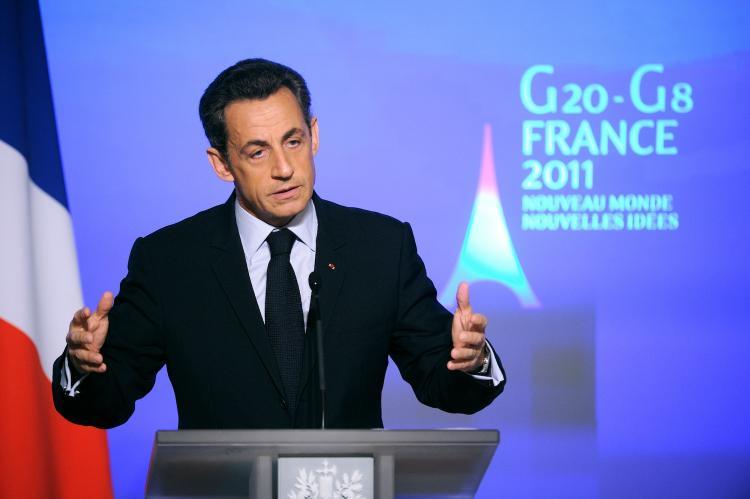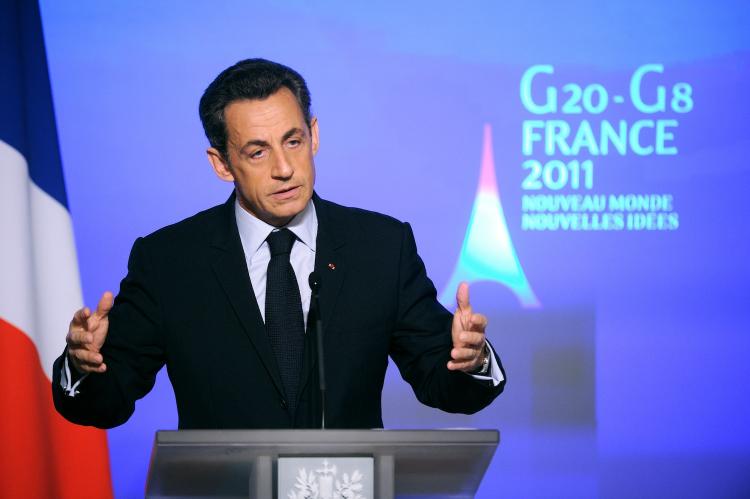After two months, which Nicolas Sarkozy said were spent “consulting heads of state, international organizations, international unions, and company executives,” the French president announced on Jan. 25 the priorities for the French presidency of G-8 and G-20.
The opportunities and risks are high for Sarkozy who is preparing for a tough presidential election campaign in 2012 with all opinion polls currently predicting a large victory for the rival Socialist Party.
A successful G-8 and G-20 presidency could revive Sarkozy’s political reputation, tarnished in 2009 and 2010 by recurrent accusations of nepotism and conflicts of interest, and by the economic downturn. A failed presidency could possibly mean the end of credibility for Sarkozy who has vowed to strengthen France’s influence in the international arena.
In his announcement Tuesday, Sarkozy did not change the three lines of focus announced at the end of the G-20 summit in Seoul last November. France is focusing on reform of the international monetary system, regulation of the primary goods market, and identification of new ways to fund development.
The monetary system reform aims at protecting emerging countries from disinvestment, helping coordinate a balance between currencies, and avoiding protectionism. The filigree undercurrent of Sarkozy’s message is a willingness to reduce the undervaluation of Chinese yuan and diminish the supremacy of the U.S. dollar. In October 2008, Sarkozy had indicated he would push for a new Bretton Woods, a commitment he renewed in August 2010 while addressing French ambassadors. “The prosperous years after World War II were largely due to Bretton Woods’ rules and institutions,” Sarkozy said. “Since the beginning of the ’70s, we have been living in an international no-monetary system.”
Sarkozy’s tone on Tuesday was less ambitious, possibly a consequence of the Seoul G-20 summit and his recent meeting with President Obama. “France does not wish to challenge the dollar,” Sarkozy said Tuesday. “[It] has an important role and must be a strong currency, as President Obama often says.”
Yet, Sarkozy added that it is unavoidable that “the emergence of new economic powers will drive the emergence of new international currencies.” He said, “The transition is ongoing and could be a factor of instability.”
Sarkozy was harsher in his condemnation of the consequences of speculation on the primary goods market. His aim is to regulate these markets and insulate them from unhealthy speculation, which has been responsible for food shortages and major unrest in some underdeveloped countries during the past few years.
“We need to reinforce our tools to guarantee food safety,” Sarkozy said. “It is quite extraordinary that food aid organizations have to buy at the highest price! In other words, not only does speculation create hunger protests, but also NGOs, to prevent people from dying, have to pay the highest price! This is nonsense.”
The last point of Sarkozy’s message, which Le Monde newspaper elegantly described as a “planetary Colbertism,” is his intention to create a tax on financial transactions to help fund development in developing countries. “France thinks this tax is a moral one in view of the financial crisis we have just gone through, that it is useful to prevent speculation, and is efficient for finding new resources for development,” Sarkozy said.
Colbertism harkens back to France’s 17th century finance minister who believed that wealth should serve the needs of the state.
In this softened and highly social program, Sarkozy expressed more willingness to communicate and build a slow consensus than in previous statements. On the one hand, this softening is no doubt a reflection of tensions seen in Seoul when the issue of the monetary reform was raised. At a national level, this is also the best stance Sarkozy could have adopted. After years of reforms perceived as harsh on common citizens and as exercising power favoring unilateral decisions, Sarkozy has one year to create a new image: that of a modest and caring French president. The coming months and opinion polls will tell if his communication talents are up to the task.
The opportunities and risks are high for Sarkozy who is preparing for a tough presidential election campaign in 2012 with all opinion polls currently predicting a large victory for the rival Socialist Party.
A successful G-8 and G-20 presidency could revive Sarkozy’s political reputation, tarnished in 2009 and 2010 by recurrent accusations of nepotism and conflicts of interest, and by the economic downturn. A failed presidency could possibly mean the end of credibility for Sarkozy who has vowed to strengthen France’s influence in the international arena.
The President’s Priorities
In his announcement Tuesday, Sarkozy did not change the three lines of focus announced at the end of the G-20 summit in Seoul last November. France is focusing on reform of the international monetary system, regulation of the primary goods market, and identification of new ways to fund development.
The monetary system reform aims at protecting emerging countries from disinvestment, helping coordinate a balance between currencies, and avoiding protectionism. The filigree undercurrent of Sarkozy’s message is a willingness to reduce the undervaluation of Chinese yuan and diminish the supremacy of the U.S. dollar. In October 2008, Sarkozy had indicated he would push for a new Bretton Woods, a commitment he renewed in August 2010 while addressing French ambassadors. “The prosperous years after World War II were largely due to Bretton Woods’ rules and institutions,” Sarkozy said. “Since the beginning of the ’70s, we have been living in an international no-monetary system.”
Sarkozy’s tone on Tuesday was less ambitious, possibly a consequence of the Seoul G-20 summit and his recent meeting with President Obama. “France does not wish to challenge the dollar,” Sarkozy said Tuesday. “[It] has an important role and must be a strong currency, as President Obama often says.”
Yet, Sarkozy added that it is unavoidable that “the emergence of new economic powers will drive the emergence of new international currencies.” He said, “The transition is ongoing and could be a factor of instability.”
Sarkozy was harsher in his condemnation of the consequences of speculation on the primary goods market. His aim is to regulate these markets and insulate them from unhealthy speculation, which has been responsible for food shortages and major unrest in some underdeveloped countries during the past few years.
“We need to reinforce our tools to guarantee food safety,” Sarkozy said. “It is quite extraordinary that food aid organizations have to buy at the highest price! In other words, not only does speculation create hunger protests, but also NGOs, to prevent people from dying, have to pay the highest price! This is nonsense.”
The last point of Sarkozy’s message, which Le Monde newspaper elegantly described as a “planetary Colbertism,” is his intention to create a tax on financial transactions to help fund development in developing countries. “France thinks this tax is a moral one in view of the financial crisis we have just gone through, that it is useful to prevent speculation, and is efficient for finding new resources for development,” Sarkozy said.
Colbertism harkens back to France’s 17th century finance minister who believed that wealth should serve the needs of the state.
In this softened and highly social program, Sarkozy expressed more willingness to communicate and build a slow consensus than in previous statements. On the one hand, this softening is no doubt a reflection of tensions seen in Seoul when the issue of the monetary reform was raised. At a national level, this is also the best stance Sarkozy could have adopted. After years of reforms perceived as harsh on common citizens and as exercising power favoring unilateral decisions, Sarkozy has one year to create a new image: that of a modest and caring French president. The coming months and opinion polls will tell if his communication talents are up to the task.







